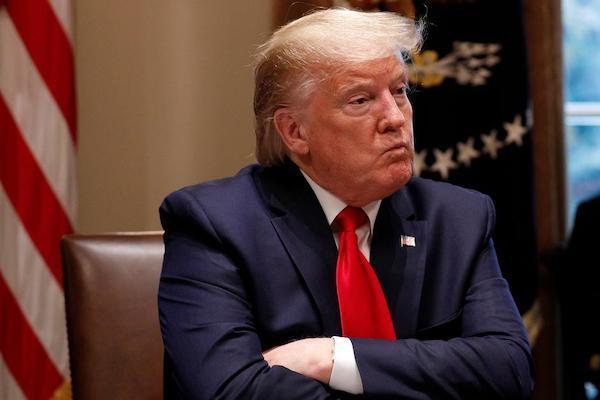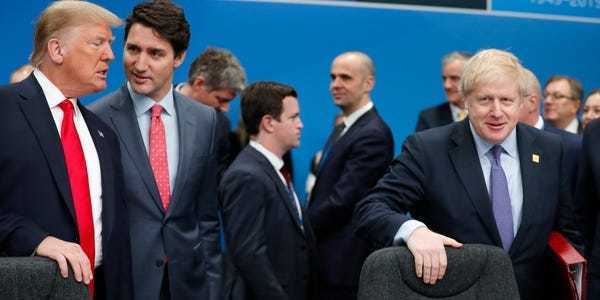 |
|
President Donald Trump. Photo: Reuters
|
"The post-Covid-19 world" will be a completely different world which will never be the same ad the world we lived in just a few months ago.
First of all, in terms of international relations, the post-Covid-19 era will shorten the time to the "New Cold War 2.0" between China and the US, as well as the division of the world into two battle lines.
Around 2,400 years ago, the ancient Greek historian and political scientist Thucydides observed and discovered the inevitable confrontation between a strong rising power and an evolving power when he studied the Peloponnsus war between Athens and Sparta.
History seems to be repeating and "pushing" China and the United States - the two most powerful forces of the era, one rising and the other establishing a dominant position on the world political chessboard - into a "fateful confrontation". This relationship is falling into the unwanted “Thucydides trap", including both leaders and people of China and the US, but they cannot find a way out.
From a global perspective, it is normal to see relations between nations in the international relations system get better or worse. But when the relational transitions involve big countries, especially those in positions 1 and 2 in the world, which represent economic forms, ideologies, and gathering forces ... of a contradictory nature such as the United States and China, it is no longer normal as it immediately affects the political forces gathered in the regions and on a global scale.
That fact has been verified by the US-Soviet confrontation during the Cold War, and the Sino-US relationship is no exception.
From that perspective, the deterioration of Sino-US relations as well as the early forming of a new bipolar world in the Cold War 2.0 is a difficult trend to reverse. Efforts such as the US-China trade agreement for the first period signed on January 15, 2020 will only help the two sides delay a little time.
The Covid-19 pandemic has "helped" speed up this confrontation process. Pew on April 21, 2020 announced the startling results of its poll: Up to 66%, or two-thirds of Americans participating in the pool, showed negative attitudes about China, while only 26% had a positive attitude.
When President Trump came to power in 2017, 47% of Americans had a negative attitude toward China, while 44% had a positive attitude. Also in a public poll on April 21, 91% of consulted Americans said that China's power and influence in the world is a threat to the US.
On the opposite side, the situation is not much different. Leaders, as well as many Chinese, believe that the United States is trying to find ways to hold back China from becoming a world power.
The longer the pandemic, the greater the loss of life and wealth in the United States, the "lack of sympathy" from the Trump administration, and the American public opinion toward China - where they believe is the “root” of Covid-19 - is on the rise.
They do not even care about China's explanation that a pandemic is a natural law and can break out anywhere and anytime in the world, and it was just a "coincidence" when it originated from China.
But deep down is the extreme anxiety of the American elite that the United States is "falling ill" while China is on the road to recover quickly and can take this opportunity to overcome the US.
Former US Assistant Secretary of State Kurt Campbell warned that the Covid-19 pandemic could be the "Suez Moment" that marked the collapse of the American Empire, similar to the collapse of the British Empire after the Suez Canal crisis event in 1956.
While the Trump administration is working on a plan, a number of Republican and Democratic politicians and "hawk" scholars have begun to offer "tit for tat" scenarios to make China as miserable as possible.
For example, Republican Senator Lindsey Graham, Chairman of the Senate Judiciary Committee, suggested a tax (Pandemic Tariffs) on imports from China to "offset" the damage caused by the pandemic to America.
Going further, scholar Harry Kazianis devised a plan with five initial steps: (i) Boycott of the Winter Olympics held in 2022 in Beijing similar to the US and Western’s boycott of the Moscow Summer Olympics in 1980; (ii) Diplomatic recognition of Taiwan; (iii) Goods imported from China to the US must have "Made in China" printed in the front for Americans to "stay away"; (iv) Find ways to promote human rights in China; and (v) Change the internal law so that affected US citizens and companies can sue and demand compensation to make China financially depleted.
Another scholar, Professor Gavin Clarkson, even asked the Trump administration to "confiscate" US$1,100 billion of US government bonds that China owns to pay for the losses caused by Covid-19 that the US is suffering.
US allies such as Australia, the UK, Germany, France ... also started consultation process, joint actions, firstly to open independent investigations on the reason for Covid-19 spread soon after the Covid-19 pandemic is over.
For its part, China is seeing these developments as "antics". With the spirit of a big nation, they probably will not "sit still", leaving the US and the West "bullying" as in the "disgraceful century" before.
Sino-American suspicion, hostility, even confrontation will no longer be confined in the geopolitical, geostrategic aspects, or "inside story" between major countries, but will quickly spread, impacting the economic field, the consideration and strategic selection of small and medium countries – which will sooner or later be "pulled" into the power game between the two superpowers.
 |
|
"The post-Covid-19 world" will be a completely different world, which will never be the same as the world we lived in just a few months ago.
|
While dealing with global geopolitical uncertainty, it is worrisome that the picture of economic recovery after the Covid-19 pandemic for most countries is also not very bright, reflected in the following aspects:
Firstly, overall, during the Covid-19 pandemic there were almost no exceptions as all countries in the world suffered heavy losses in human life or materials or both.
The production capacity of countries and the "demand" of consumers stopped suddenly, and are hard to recover in the short term. Production and consumption are two closely related factors: From a demand perspective, most people in the anti-epidemic time had to struggle due to financial difficulties, reduced income, so they were forced to cut spending.
That is not to mention the psychological factor formed during the isolation process, which is to live simply, buy only essential items for life, while still having to save money to deal with the difficulties that can happen at any time. With such a weak aggregate demand, production and services will recover slowly.
Secondly, the whole chain economy, with complex structures, is closely connected into a closed stage from raw material exploitation, processing, logistics, services, warehousing, airports, seaports ... It was suddenly broken and needed to be rebuilt.
A number of countries in Southeast Asia, including Vietnam, are luckily considered the new destination of multinational companies in the process of product transformation and restructuring. However, this process can take years, with tremendous efforts by the government and business to produce results.
Thirdly, exporting raw materials, fuels, agricultural products, finished goods ... Is not considered to be the best solution to help emerging and developing economies to achieve economic growth, escape poverty and develop.
The reasons are: (i) Worldwide demand is affected; (ii) Countries are in the process of reviewing and reorganizing national production capacity, seeking to minimize external dependence. In particular, big markets such as the US and EU will prioritize self-sufficiency of essential goods, or shift production investment close to the consumption market based on the off-shore model to near-shore or in-shore models; (iii) The level of economic integration and globalization of international economic life is significantly reduced, with the possibility of the global market being "divided" under the impact of Sino-US competition.
Fourthly, many countries are reluctant to "launch" huge bailouts, essentially acting as "breathing machines" to help businesses, citizens and the economy escape from the immediate disaster like destruction, unemployment. They also understand that debt is a double-edged sword, and if it is not used wisely, it is like using poison to refresh themselves at the moment.
Indeed, although using different beautiful names such as "rescue", "support", "stimulation" ... actually this is borrowing of the future to solve immediate problems.
Fifthly, due to weak economic base, limited cumulative investment, poor and developing countries will be at greater risk: (i) The World Bank predicts that these countries will sink into recession in 2020; (ii) In the immediate future, approximately 150 million people in developing countries will be at risk of serious food shortage, followed by the risks of poverty, disease, social instability, the risk of brain drain and the cash flows for development flowing to rich countries; (iii) The possibility of "self-help" if there is any risk.
Previously, the International Monetary Fund (IMF), the World Bank (World Bank), the Asian Development Bank, G7 and G20 countries ... were considered the last support for countries in financial crisis or in danger of bankruptcy. But this ability is still very low because the creditors are also "seriously ill", and the number of “patients” who are in danger of being admitted to emergency is too crowded.
Conclusion
“The world in the post-Covid-19 era" series tries to honestly describe the perspective of future changes in the world, from the formation of new forces, the Sino-US relations, the face of the world, the difficulties and challenges posed to all countries, as well as some major trends such as nationalism, globalization, global governance, and technological change forecasts, the adaptation of nations in the construction of health protection systems ...
These articles only partially reflect the changes in a new world. There are many other questions that each person, from his or her own angle, interest, and understanding, can raise and share.
Dr. Hoang Anh Tuan

The world in the post-Covid-19 era (Part 5)
Science and technology help people cope with pandemics like Covid-19 and help society adapt to pandemics.

The world in the post-Covid-19 era (Part 4)
American scholar Stephen Walt, a realist and an ardent supporter of nationalism, said the post-epidemic world is a world that is less open, less prosperous and less free.

The world in the post-Covid-19 era (Part 3)
Originally regarded as a "savior", the Covid-19 pandemic has created new skepticism, considering globalization as a "criminal" that spread the coronavirus epidemic across the globe and caused the current disaster.
 Despite the best scenario, the consequences that the invisible Covid-19 enemy has caused to nations and international relations are severe, which will affect the world decades later.
Despite the best scenario, the consequences that the invisible Covid-19 enemy has caused to nations and international relations are severe, which will affect the world decades later.